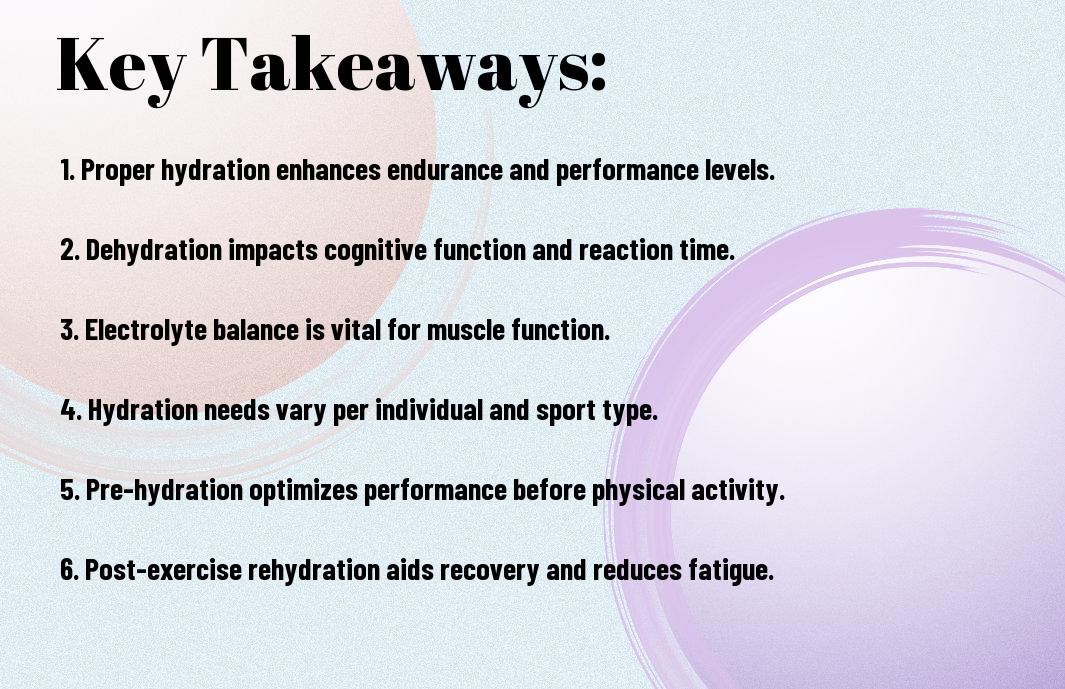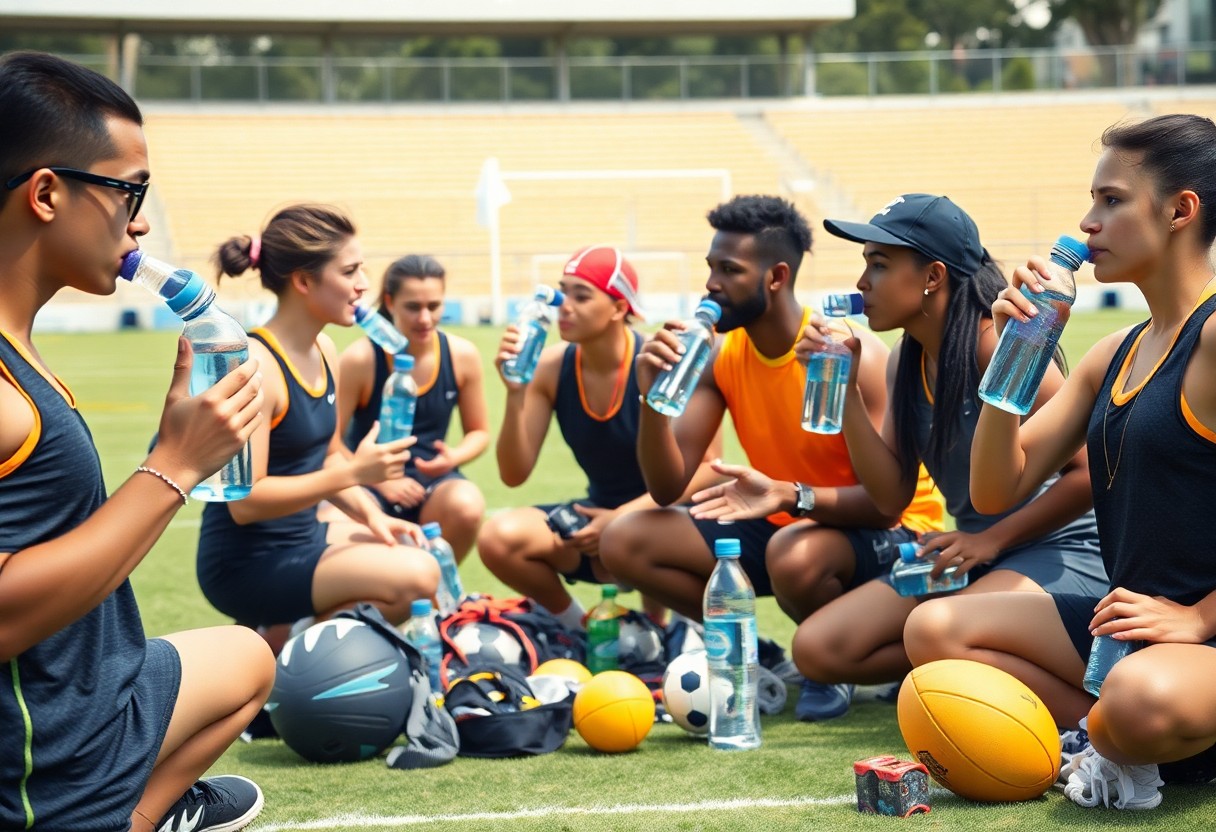Over the course of your athletic journey, understanding the importance of hydration can significantly influence your performance and recovery. When engaging in physical activities, maintaining optimal fluid balance is vital for regulating body temperature, preserving endurance, and enhancing overall effectiveness during sports. To deepen your understanding, explore insights on Hydration to Maximize Performance and Recovery. Emphasizing proper hydration strategies will not only help improve your game but also support your body in adapting to various demands of your sport.
Key Takeaways:
- Optimal Performance: Proper hydration enhances physical performance, allowing athletes to maintain endurance and strength during training and competitions.
- Prevention of Dehydration: Staying hydrated helps prevent the negative effects of dehydration, which can lead to fatigue, decreased coordination, and impaired cognitive function.
- Temperature Regulation: Adequate fluid intake aids in regulating body temperature, especially during intense exercise and in hot environments.
- Recovery: Hydration plays a significant role in recovery post-exercise by promoting muscle repair and reducing the risk of cramps and injuries.
- Individual Needs: Hydration requirements vary among athletes based on factors like intensity, duration of activity, climate, and personal body composition.
The Importance of Hydration in Sports
The role of hydration in sports cannot be overstated. Proper fluid intake supports every aspect of your physical performance, from endurance to muscle function. Without adequate hydration, you risk decreased stamina, increased fatigue, and impaired recovery. Staying well-hydrated ensures that your body can efficiently regulate temperature and maintain optimal cardiovascular function, enabling you to perform at your best during training or competition.
Physiological Benefits
Importance of hydration extends to your physiological performance. Adequate fluid levels maintain blood volume and circulation, ensuring that your muscles receive the oxygen and nutrients they need to function optimally. Hydration also aids in waste removal and temperature regulation, crucial for sustaining prolonged athletic performance and enhancing recovery post-exercise.
Mental Clarity and Performance
With proper hydration, you can experience significant improvements in mental clarity and overall performance. Staying hydrated plays a key role in cognitive function, including focus, reaction time, and decision-making skills, all vital for peak athletic performance. When you are dehydrated, even mild deficits can lead to confusion and fatigue, hindering your ability to think clearly during intense physical activity.
Another factor to consider is that dehydration can impact your mood and motivation, which can affect your training efficiency. When you are adequately hydrated, you enhance not just your physical capabilities but also your mental resilience to push through challenging workouts or competitions. Staying on top of your hydration can lead to improved consistency, better skill execution, and heightened levels of concentration, enabling you to maximize your potential in sports.

Hydration Guidelines for Athletes
Some basic hydration guidelines can help optimize your sports performance. Aim to drink fluids regularly throughout the day, as thirst alone is not a reliable indicator of hydration levels. You should adjust your fluid intake based on your activity level, climate, and individual needs to maintain optimal hydration before, during, and after exercise.
Daily Water Intake Recommendations
Daily water intake recommendations vary based on factors like body weight, activity level, and environmental conditions. Aim for at least half your body weight in ounces of water each day, increasing that amount if you are active or exposed to high temperatures.
Electrolyte Balance
Athletes need to maintain electrolyte balance for optimal performance and recovery. Electrolytes, including sodium, potassium, and magnesium, play a vital role in muscle function and hydration. During intense exercise or prolonged activity, your body loses these important minerals through sweat.
With proper replenishment of electrolytes, you can help prevent muscle cramps, fatigue, and dehydration. It’s beneficial to consume electrolyte-rich beverages or supplements, particularly after intense workouts or events. Aim to include foods high in electrolytes, such as bananas, leafy greens, and nuts, in your daily diet to support your overall hydration strategy and improve your athletic performance.
Signs of Dehydration
Despite the common understanding of hydration’s importance, many athletes often overlook the subtle signs of dehydration. Recognizing these early symptoms can be vital for maintaining optimal performance. You might experience increased thirst, dry mouth, or infrequent urination, all of which indicate that your body is in need of fluids. Ignoring these signals can lead to further complications and hinder your performance on the field or track.
Physical Symptoms
For many athletes, physical symptoms of dehydration can manifest in various ways. You may notice a decline in your energy levels, accompanied by fatigue or dizziness. Additionally, muscle cramps, headaches, or dry skin can also be indicative of a lack of proper hydration. Being aware of these signs can help you take timely action to rehydrate and enhance your overall performance.
Impacts on Athletic Performance
Before you realize it, dehydration can significantly impact your athletic performance. Even a slight decrease in body fluid can lead to reduced coordination, diminished strength, and decreased endurance, making it difficult for you to achieve your goals.
A mere 2% loss of body weight due to dehydration can lead to noticeable impairments in your performance. This can translate to slower reaction times, inefficient thermoregulation, and increased perception of effort during your workouts. As a result, you may find your training sessions less effective and your competition results underwhelming. Staying attuned to your hydration levels is imperative to fully optimize your athletic potential.
Hydration Strategies During Training
Now, establishing effective hydration strategies during training can significantly improve your performance and recovery. Prioritizing hydration before, during, and after your workouts will help you maintain optimal body functions, enhance endurance, and prevent fatigue. Be mindful of your sweat rate and adjust your fluid intake accordingly to ensure your hydration levels support your training goals.
Pre-Workout Hydration
Below, consider aiming to drink 16-20 ounces of water or sports drink about two hours before your workout. This pre-workout hydration will prepare your body for the upcoming physical demand, minimizing the risk of dehydration. Monitoring your fluid intake in the hours leading up to your training is vital to ensure you’re adequately hydrated.
Hydration During and Post-Exercise
Between your training sessions, maintaining proper hydration is key to sustaining performance. Aim to consume 7-10 ounces of fluid every 10-20 minutes during exercise, especially in hot or humid conditions. Post-exercise, your hydration strategy should focus on replenishing lost fluids, ideally with water or electrolyte-rich drinks, to enhance recovery.
Training regimens can lead to significant fluid loss through sweat, particularly during intense workouts. To mitigate this, monitor your body weight before and after training; for every pound lost, replace it with 16-24 ounces of fluid. This practice will aid in restoring your hydration levels and preparing you for subsequent sessions, ensuring that you remain at your best for all future workouts.

Special Considerations for Endurance Sports
Not all athletes share the same hydration needs, especially in endurance sports. You may need to pay particular attention to your hydration strategy, as prolonged physical exertion increases fluid loss through sweat. Understanding how to maintain adequate hydration levels can enhance your performance and reduce the risk of dehydration-related issues.
Long-Distance Events
Around the clock, your body is utilizing water to regulate temperature and maintain optimal performance during long-distance events. Ensuring you are adequately hydrated before, during, and after your event can significantly impact your stamina and endurance on race day.
High-Intensity Activities
High-intensity workouts demand quick bursts of energy and can lead to rapid fluid loss. You should focus on integrating hydration strategies to replenish what is lost and support your performance during these intense sessions.
Activities such as circuit training or sprinting not only elevate your heart rate but also increase sweat production, making hydration all the more important. You may need to consume water or electrolyte-rich fluids before and after your workouts to restore your hydration levels effectively. Consider incorporating small sips during training to maintain optimal fluid balance and prevent fatigue.
Myths and Misconceptions about Hydration
Unlike popular belief, hydration isn’t solely about drinking water when you feel thirsty. Many athletes operate under the misconception that they can achieve optimal performance without a structured hydration plan, often leading to imbalances that affect endurance and recovery.
Common Misbeliefs
Beside the assumption that only water is needed for hydration, some also think that consuming caffeinated beverages is detrimental. In reality, your hydration strategy should include a variety of fluids, as not all drinks cause dehydration.
Evidence-Based Clarifications
Along with the myths surrounding hydration, several evidence-based principles can help clarify your understanding. Many studies indicate that you can maintain hydration effectively through various beverages, including those that contain electrolytes and even caffeine, provided they are consumed in moderation.
To further debunk myths, scientific research shows that sports drinks with electrolytes can outperform plain water, especially during intense exercise, as they replenish valuable minerals lost through sweat. Additionally, hydration needs can vary significantly based on factors such as climate, body size, and activity intensity. By monitoring your hydration status—through urine color or weight changes—you can fine-tune your intake for optimal performance.
Summing up
From above, it is evident that proper hydration significantly impacts your sports performance. Staying adequately hydrated helps maintain your energy levels, enhances your endurance, and aids in faster recovery. By paying attention to your hydration needs before, during, and after physical activity, you can optimize your performance and overall well-being. Therefore, make hydration a priority in your training regimen to achieve your athletic goals effectively.
FAQ
Q: How does hydration impact athletic performance?
A: Hydration plays a significant role in athletic performance. When an athlete is adequately hydrated, their body functions optimally, supporting endurance, strength, and overall performance levels. Dehydration can lead to fatigue, reduced coordination, and increased risk of injury. Studies have shown that even a small decrease in fluid levels can adversely affect physical capabilities, making effective hydration strategies vital for both training and competition.
Q: What are the signs of dehydration during sports activities?
A: Athletes should be aware of several signs that may indicate dehydration. These include thirst, dark yellow urine, dry mouth, fatigue, dizziness, and muscle cramps. Additionally, a decrease in performance, such as difficulty in maintaining pace or focus, can also suggest insufficient hydration. Monitoring these symptoms can help athletes make timely adjustments to their fluid intake during training and competition.
Q: How much water should athletes drink before, during, and after exercise?
A: The amount of water needed varies based on several factors, including the individual’s body weight, the intensity and duration of exercise, and environmental conditions. Generally, athletes are advised to drink about 500-600 ml of water 2-3 hours before exercise, followed by 200-300 ml 20-30 minutes before starting. During exercise, consuming 200-300 ml every 15-20 minutes is often beneficial. Post-exercise, it’s recommended to replace fluids lost through sweat. Monitoring body weight changes before and after workouts can also provide guidance on specific hydration needs.


